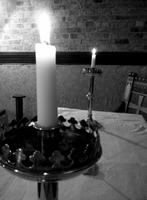Continuing in my series of Sixth Birthday Celebration Repeat Postings, here is a post which has proved consistently popular with browsers since it first appeared on October 3rd, 2005. Seems there are quite a few Wyatt fans out there ...

A Tudor moment, with a glance at Whoso list to hunt (whoever chooses to hunt). This sonnet by Thomas Wyatt (1503-1542) is a personal favourite of mine. It's a loose translation of Petrarch but entirely Wyatt's own, possibly written about a clandestine affair he's reputed to have had with Anne Boleyn, speaking across the centuries of frustrated love, impossible love, love at a distance.
A hind, of course, is a female deer.
Whoso list to hunt, I know where is an hind,
But as for me, alas, I may no more.
The vain travail hath wearied me so sore,
I am of them that farthest cometh behind,
Yet may I by no means my wearied mind
Draw from the deer, but as she fleeth afore
Fainting I follow. I leave off therefore
Since in a net I seek to hold the wind.
Who list to hunt, I put him out of doubt,
As well as I may spend his time in vain,
And graven with diamonds in letters plain
There is written her fair neck round about:
Noli me tangere for Caesar's I am,
And wild for to hold though I seem tame.
Noli me tangere = Do not touch me (poachers of the king's deer could expect the death penalty - as could poachers of the king's wife!)
This modern version of Whoso list to hunt comes from Hardiman Scott's edition of Wyatt's Selected Poems, which is published by Carcanet Press. Here's the back cover copy for those who'd like to know more.
Sir Thomas Wyatt (1503-1542), 'the first great English lyric poet', remains one of the most popular writers of Henry VIII's court, and perhaps the most romantic, given his entanglement with Anne Boleyn, which resulted - legend has it - in some of his most passionate and vulnerable poems. This book contains a representative selection of the work: all the best-loved poems and many lesser-known pieces which illuminate a complex and sophisticated sensibility. Hardiman Scott sees Wyatt as a modern poet before his time and demonstrates the impact he and his younger contemporary the Earl of Surrey had on the development of English poetry. Wyatt introduced the sonnet, terza rima and other Italian verse forms into English, and invented forms and processes of his own.
For those trying to remember the other much-anthologised poem by Wyatt, try this link to an online copy of his superb 'They flee from me that sometime did me seek'. More on Wyatt on this blog too, in an October 2007 entry.
1 comment:
Dear Jane
Excellent choice! There was a superb programme on Sir Thomas More's daughter Margaret on BBC4 the other day presented by the historian Dr Helen Castor. I don't know whether you watched it or not.
Best wishes from Simon
Post a Comment